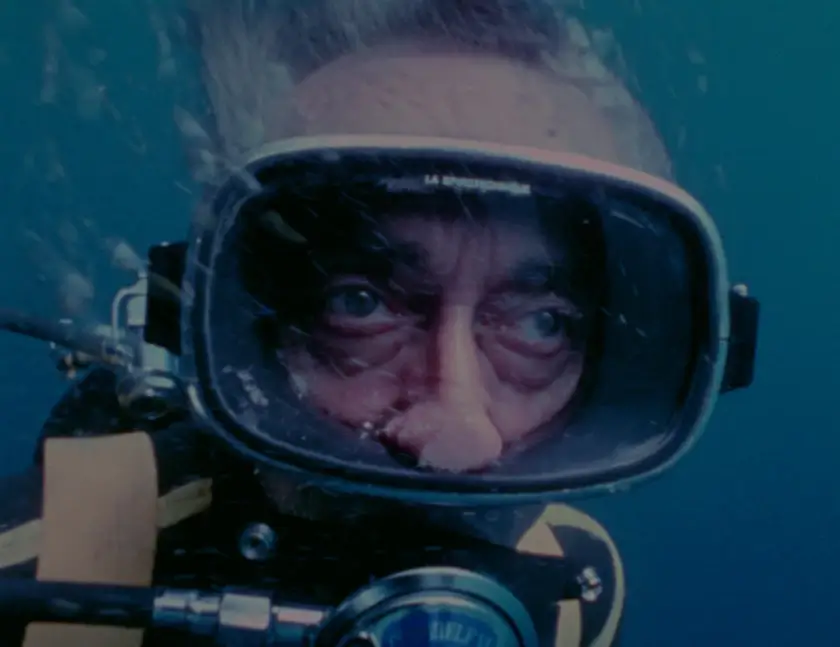
French oceanographer, conservationist and filmmaker Jacques-Yves Cousteau, the most recognizable name in undersea exploration at the time of his death in 1997, hated the term “documentary” being applied to his beloved movies. They were the first of their kind to bring the wonders of ocean life to the masses, starting with the Cannes-and-Oscar-winning “The Silent World” in 1956 and continuing with his numerous television specials. But to him, the label “documentary” implied an expert talking down to you about everything they know, when what he was making were “true adventure films.”
That this tidbit from Cousteau’s journal entries comes courtesy of a documentary — Liz Garbus’ beguiling “Becoming Cousteau” — isn’t meant to be some wink across time. (It’s read by Vincent Cassel, whose voice alternates with Cousteau’s own as narrative overlay.) But it does point up how much documentaries have evolved, and Cousteau helped that along, inventing not only equipment for diving (the Aqua-Lung) and techniques for filming underwater, but also a livelier approach to nonfiction that prized the wonder of witnessed experience over the well-established dryness of the educational.
The benefit of this untrained scientist and born showman preferring a camera to a notebook — Cousteau had been making home movies since he was 13 — is that Garbus has enough footage for “Becoming Cousteau” to be a fine example of another wonderful sub-genre of documentary to emerge from the form’s immersive possibilities: the archival film, a tableau of the found sporting its own thematic, narrative architecture.
Working with Cousteau’s own films and video, his public appearances, photographs, audio interviews and a treasure trove of little-seen pre-fame footage as a young man falling in love with diving, Garbus and editor Pax Wassermann stitch together a briskly paced overview of an illustrious life in all its achievement and complexity, both below and above the water.
What emerges — as implied in the title — is an intriguing portrait of personal curiosity made professional, but also how maintaining that curiosity challenges and transforms the individual. At first, we ride Cousteau’s ascension from diving enthusiast to red-capped sea icon on his signature boat the Calypso as if holding on to a dolphin’s tail as it glides through blissfully open waters — the accompanying score from Danny Bensi and Saunder Jurriaans like a lilting breeze. But occasionally, the air is colored and salted by human complications, namely his neglectfulness as a husband and dad. His wife/business partner Simone comes off as a tough but lonely soul, while the participation of sons Jean-Michel and Philippe in the family trade brought swirls of joy, discord and sorrow to their dad as time went on.
A valuable narrative thread Garbus stresses is that of a popular authority who could look back and forward at his life’s work with intelligence and humility. (One overheard interviewee describes his face on camera as always appearing to be looking into the future.) In later years, scenes in “The Silent World” of Cousteau’s crew’s disruptive attitude toward animal life became unbearable to him. He also pursued his passion long enough to realize how much global ecological harm humans were causing and, as his crusading for the planet intensified, came to regret his early funding from petrochemical companies.
Starting the eco-advocacy nonprofit the Cousteau Society was one redemptive move, but it’s one of the documentary’s more bitter ironies that the gig he took in the ‘60s to finally divorce his expeditions from oil dollars — filming a television series for ABC — ended when the network balked at his increasing pessimism regarding a damaged environment. (After getting the axe, he was free to use alarming film titles like “Time Bomb at Fifty Fathoms.”)
“Becoming Cousteau” may not be as deep a journey as some would hope, but for having to chart a lot of years, it hits its points about passion, fame and activism smartly, even movingly. You’re left marveling at how a guy who began diving to nurse his way back from injury could reach his end realizing the Earth needs that same ardor for its own healing.


